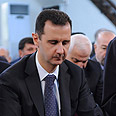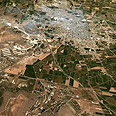

Syria warned on Saturday that rebels could use chemical weapons in their fight against President Bashar Assad's forces, and insisted that the regime will never unleash such arms on its own people.
British Foreign Secretary William Hague, however, said there was evidence the Damascus government could actually employ chemical weapons stocks in the conflict which a rights group says has killed at least 42,000 people in nearly 21 months.
Related stories:
- Angelina Jolie visits Syrian refugees in Jordan
- UN chief warns Syria's Assad on chemical weapons
- Report: Syrian military arms chemical weapons
"Terrorist groups may resort to using chemical weapons against the Syrian people... after having gained control of a toxic chlorine factory" east of Aleppo, the foreign ministry said, using the government term for rebel groups.
It added that Damascus would never use such weapons against its own people.
The ministry was believed to be referring to the Syrian-Saudi Chemicals Company (SYSACCO) factory near Safira, which was taken over earlier this week by militants from the jihadist Al-Nusra Front.
Syria "is defending its people against terrorism, which is supported by known countries, with the United States at the forefront," the ministry said.
Global concerns over Syria's chemical weapons stockpiles grew after US officials this week privately said the regime had begun mixing precursor chemicals that could be used for the lethal nerve agent sarin.
Some media reports said that the substance had been loaded into bombs for warplanes.
Hague said on Saturday there was evidence Syrian government forces could use chemical weapons against the insurgency.
"We are extremely concerned about the stockpiles of chemical and biological weapons, and we are also concerned about evidence during the last couple of weeks that the regime could use them," he told reporters in Manama on the sidelines of a security conference.
Hague said Britain had joined the United States in delivering a strong message to Assad's government and that the global community had "contingency plans concerning chemical weapons but will not disclose them."
He cited several "dangerous scenarios," including their "use by the regime" or falling into the hands "of other people."
Washington has said the use of chemical weapons would be a red line but that it fears rebel battlefield advances could prompt the regime to use them, or that stocks could fall into the hands of groups hostile to the US and its allies.
UN chief Ban Ki-moon said on Friday said it would be an "outrageous crime" if the regime used chemical weapons against the revolt.
The Organisation for the Prohibition of Chemical Weapons, the global chemical weapons watchdog, asked Damascus to sign up to a convention banning their use, citing "serious concerns" that for the first time in the agreement's history they might be used.
The opposition Syrian National Council said even neighbouring countries would not be spared if such weapons were used.
"We ask the countries of the world to act before disaster hits, not after," SNC chief George Sabras said.
"The Syrian people will neither forget nor forgive anyone who orders the use of weapons of mass destruction, or anyone who is complicit in the crime, or anyone who moves only after the crime is committed."
Unifying rebel ranks
Syria's new opposition coalition, meanwhile, said it will announce the creation of a military council before a Friends of Syria meeting next week, to unify insurgent ranks.
In mid-November, opposition factions agreed to establish the National Coalition and bring together rebel forces under a supreme military council.
"The council will be exclusively responsible for receiving military aid which we obtain" from outside Syria, council Secretary General Mustafa Sabbagh told AFP.
On the ground, the Syrian Observatory for Human Rights reported at least four fighters killed as troops battling rebels near Damascus bombarded opposition strongholds in the south of the city and on its northeastern outskirts.
For several days, the army has pounded rebel strongholds on the capital's outskirts, raising fears of a looming ground assault.
Thirty-one of the 72 people killed nationwide on Friday died in the Damascus region, said the Britain-based Observatory, which relies on a countrywide network of activists and medics when compiling its tolls.
- Receive Ynetnews updates
directly to your desktop















